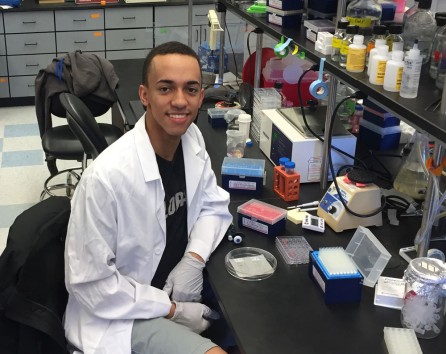Crnic Institute begins undergraduate scholarships
for students interested in Down syndrome research. They complement the graduate and postdoctoal fellowships organized by Crnic and funded by Global.

Darian Williams, Crnic Institute for Down Syndrome undergraduate scholarship recipient
A new Undergraduate Scholarship Program being offered through the Linda Crnic Institute for Down Syndrome and the University of Colorado has the potential to expand existing Down syndrome research and get a new generation of undergraduates interested in studying Down syndrome.
Darian Williams, a 20-year-old molecular, cellular, and developmental biology major at CU, is the first recipient of the Crnic Institute’s undergraduate research scholarship. Darian works in the laboratory of Bradley Olwin, Ph.D., a recipient of a 2014 Crnic Institute Grand Challenge Grant for his work on mechanisms of muscle dysfunction in Down syndrome. In addition to that work, Dr. Olwin researches muscular dystrophy and other muscle-related disorders.
“Our lab focuses on muscle stem cells, which are responsible for muscle repair and are often altered in conditions such as Down syndrome,” Williams said. “In our previous muscular dystrophy research, we used Ts65 mice, which exhibit many of the same characteristics as individuals with Down syndrome. Our preliminary experiments showed that these mice had defects in muscle stem cells, and we wanted to use that to better understand the function of these cells in individuals with Down syndrome.”
Expanding the Crnic Institute’s Reach
This is the first year the Undergraduate Scholarship Program has been offered through the Crnic Institute, and the pool of applicants included CU undergraduates interested in Down syndrome research.
“A combination of things made this possible, and one is certainly the funding we receive from the Global Down Syndrome Foundation,” said Tom Blumenthal, Ph.D., Executive Director of the Crnic Institute. “The other is the scientific problem itself. The available tools that can help us understand how the third copy of chromosome 21 causes all that it does are dramatically increasing. We’ve now reached a point where a concerted effort can enable us to understand the condition, and hopefully to intervene.”
Making Scientific Progress
The reality is that conducting biomedical research is increasingly expensive and requires a great deal of financial resources, Dr. Blumenthal noted. Through Global’s support, the Crnic Institute has gone from partnering with just two labs at the University of Colorado to partnering with 24.
The undergraduate scholarships come in addition to the existing Crnic Institute Grand Challenge Grants, which have provided $2.5 million to 27 research projects. Also, the Crnic Institute-affiliated Sie Post-Doctoral Fellowship Program at the BioFrontiers Institute funds three post-doctoral researchers. Recipients of these grants focus their work on medical and cognitive issues in individuals with Down syndrome, such as optic development and genetic analysis of autoimmunity.
“Our purpose is to make scientific progress,” Dr. Blumenthal said. “We hope that increasing the number of openings in our labs for interested undergraduate researchers helps us accomplish that.”
Dr. Blumenthal is excited about the future of Down syndrome research.
“We’re suddenly able to track this extra chromosome, where we weren’t before,” Dr. Blumenthal said. “It’s a matter of putting good money behind good science.”
Learn more about the research being funded by Global by checking out our Research & Medical Care section.
Recent Posts
- Happy Thanksgiving from Our GLOBAL Team: Thank You for Being Part of Our Family
- “They Came to Us!” Nebraska Mom Shares Family’s Research Experience
- Hollywood Stars, Advocates and Models with Down Syndrome Shine at GLOBAL’s Be Beautiful Be Yourself Fashion Show
- Jessica Biel Joins Star-Studded Lineup to Support Global Down Syndrome Foundation During Awareness Month
- Exclusive Interview with Black Down Syndrome Association Co-Founders Kelli Caughman & Crystal Lotterberry


 Experience our inspirational and groundbreaking videos and photos. Our children and self-advocates are beautiful AND brilliant!
Experience our inspirational and groundbreaking videos and photos. Our children and self-advocates are beautiful AND brilliant! Make sure your local Representatives are on the Congressional Down Syndrome Task Force.
Make sure your local Representatives are on the Congressional Down Syndrome Task Force.